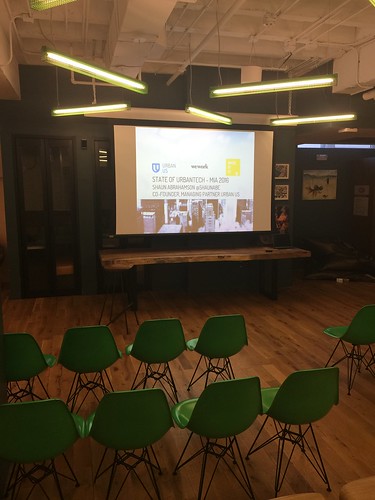Last Tuesday’s event The State of UrbanTech – MIA 2016 gathered a small but dedicated group to discuss the present and future impact of urban technology in cities, specifically Miami.
The presentation began by asserting two interesting figures for future cities: 2 times population increase and 5 times decrease in greenhouse gas emissions. Cities are now being redesigned to fit more people while using less resources.
Edward Glaeser’s book Triumph of the City assures this by emphasizing the fact that clustered cities are more productive and economically viable given the ease in flow of the new information economy and creativity. The problem, however, arises when cities are being re-imagined to a scale that is just not seemingly plausible.
For example, the speaker at the event said the new emphasis for city planning is for turning a Houston into a Hong Kong. While it would be ideal to have a clustered-city with endless economic opportunity and growth, Hong Kong too is facing its own set of issues concerning population growth and city planning.
We must ask if we should base models for future growth on presently successful cities, or if we need to completely re-imagine the notion of the metropolis in order to successfully integrate urbantech.
Faudra-t-il redéfinir l’urbantech ?.
La technologie urbaine (urbantech en anglais) devrait servir la communauté et l’environnement, en créant un équilibre entre le développement urbain et la durabilité écologique. Même si les urbanistes disent que l’urbantech est le futur des villes, il faut bien analyser les villes qui sont déjà en train d’implémenter ces technologies. A Miami, par exemple, les transports en commun sont très désorganisés et inefficaces.
Pour essayer de réduire les émissions de CO2 le gouvernement floridien annonce un plan de réorganisation pour les transports. Ce-plan là serait basé sur le modèle allemand. Mais, en essayant d’implémenter une stratégie qui est utilisé à Munich par exemple, ne marcherait pas. Chaque ville est différente et ces implémentations d’urbantech devront être différentes aussi. Alors, est-ce qu’une ville commence à implémenter de l’urbantech au niveau personnel ou collectif dès le commencement ? L’urbantech commence où et se fini où ? Il faudrait bien répondre ces questions pour qu’on puisse commencer à en comprendre.









Follow Us!